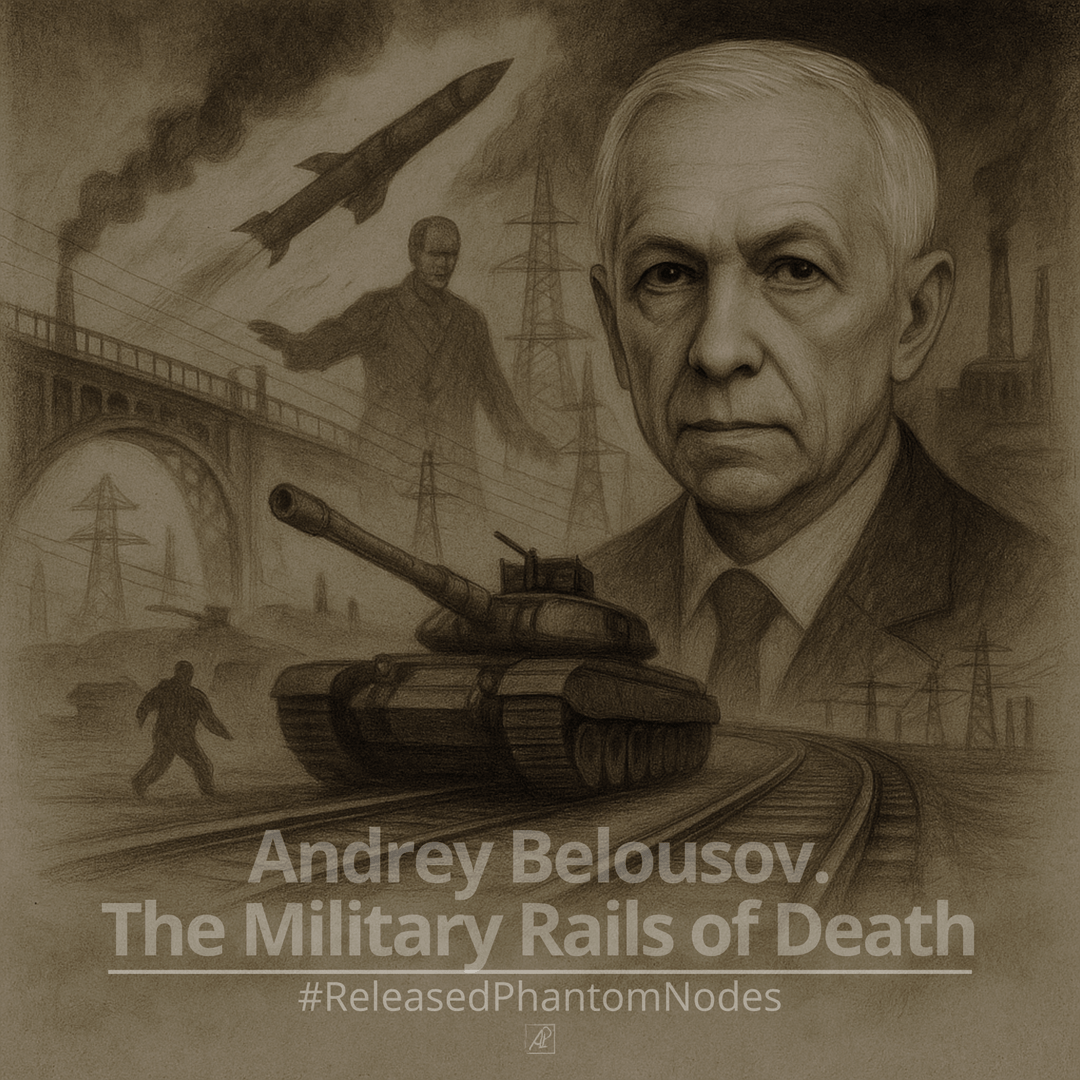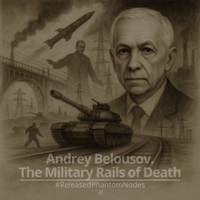
🕳️ Released Phantom Node 38: Andrey Belousov. The Military Rails of Death
- Foundation date
05 August 2025
This project is a philosophical and artistic study of the phenomenon of "phantom nodes" — invisible yet influential objects and subjects in the contemporary global system. The descriptions contained within this study are metaphorical and allegorical, aimed at uncovering systemic problems, regimes, and civilisational influences. They are not a journalistic investigation or legal accusations, but serve as an artistic interpretation of reality.
🕳️ Released Phantom Node 38: Andrey Belousov. The Military Rails of Death
Technocracy without ethics becomes a weapon of the regime.
Who is this?
Andrey Belousov is a Russian economist and technocrat, appointed Prime Minister of the Russian Federation in May 2024.
Previously a presidential advisor and deputy prime minister, he played a central role in gradually transitioning the country to a wartime economy.
Not an ideologue, but an engineer of state systems. His tool is data. His output is death.
Type of node:
Administrative and economic structure
Status:
Above the system, faceless, executing the logic of the state
Form of control:
Monopoly on resource distribution, control over sectors, bureaucratic loyalty
Phantom image:
A silent train conductor on the rails of death — precise, cold, impersonal
What remains after the phantom:
Statistical reports, militarized budget language, distributed orders
Core of the node:
What sustained it?
Absolute loyalty and efficiency in carrying out top-down decisions.
Access to economic levers: sectoral priorities, military contracts, tenders.
Positioned as a shadow coordinator of war through financial mechanisms.
How did it become a phantom?
By avoiding politics, he became its instrument.
He lost the role of expert and turned into an algorithm of execution.
No doubt, no position — only function.
Why does the phantom still exist?
Because the system is held together not only by brute force — but by logistics, budgets, and the organized machinery of death.
Figures like Belousov remain unseen, yet nothing functions without them.
Phantom’s condition:
Active. Integrated into the structure. Deprived of moral resistance.
After the regime:
Demilitarization of the economy
Elimination of war-oriented priorities
Legal accountability for aiding aggression
Exposure of anonymous functionaries
Collective reaction:
We entrusted numbers to those without a heart.
Now numbers are killing.
Core principle:
The phantom of technocracy is the least visible —
but it fuels the most monstrous systems.
Alt-text:
Graphite portrait of Andrey Belousov on aged paper.
The figure is cold, precise, and geometrically balanced — surrounded by railway elements and technical schemes.
In the background: factories, tank assembly lines, budgets turned into artillery shells.
The composition resembles a technical blueprint — no emotion, only function.
#ReleasedPhantomNode #AndreyBelousov #WarEconomy #Technocracy #FacelessPower #DeadlyBudgets #RailroadThinking #AlgorithmsOfDeath #Militarism #NumbersWithoutHeart #ResourceWarfare #WartimeBudget #MinistryOfWar #IndustrialPhantom #ExecutorsOfRegime #Complicity #MilitaryContracts #ShellsInsteadOfHospitals #PMWithoutPolitics #SilentConsent #PositionlessPhantom #InstitutionalEvil #MemorylessSystem #ExecutionOnCommand #DigitalExecutioner #BudgetLogic #WarMachine #FinancialMobilization #InvisibleCrime #EndOfTechnocracy
Unmasking the Phantom. Pivtorak.Studio. 05.08.2025
https://www.instagram.com/pivtorak.studio
🛡️ This project is an artistic and philosophical exploration.
All descriptions are allegorical in nature.
🫧 Phantom Node Dossier: Andrey Belousov. Deep Network of Control
Key Aspects of the Phantom:
"Economist of War" (or "Engineer of Mobilization Economy"). This phantom symbolizes his role as a key ideologue and architect of shifting the Russian economy onto a wartime footing, strengthening state control, and mobilizing resources for aggressive warfare. His influence lies in integrating economic and military strategy to achieve the regime's geopolitical goals.
Regimes (which he directly shapes/supports):
⚙️ Mobilization Economy / War Economy: This is the key regime he actively implements. It is a system where the entire economy is subordinated to the needs of the military-industrial complex and warfare, with intensified state control and regulation.
🟠 Authoritarianism: His activities are aimed at strengthening the economic foundation of the authoritarian regime, providing resources for its survival and aggressive policies.
🧱 Totalitarianism (Elements): The ideas of centralized state control over the economy, which are part of his worldview, have totalitarian roots, as they imply minimizing private initiative and subordinating everything to state planning.
💰 Kleptocracy (Adjacent): Although he may not be a kleptocrat in the direct sense (not prone to personal embezzlement like others), his activities within the state economy still function within a system permeated by corruption, where state orders and budget funds become objects of embezzlement. He is the "engineer" of a system that allows kleptocracy to flourish.
Tools (which he actively uses/oversees):
📈 State Planning and Control: Implementation of rigid state control and planning in key economic sectors, especially in the military-industrial complex, to ensure maximum production of armaments and military equipment.
💰 Allocation of Budget Flows: As Minister of Defense, he controls vast defense budgets, allocating them to military needs, research and development, and production.
🚫 Regulation and Restrictions: Introduction of regulatory restrictions for the private sector, forcing enterprises to fulfill state orders, control over prices and resources.
🌐 Nationalization: His ideology may lead to further steps towards nationalization of key enterprises or economic sectors to strengthen state control.
💸 Forced Financing: Compelling big business and the population to finance military needs through taxes, fees, or "voluntary" contributions.
🗣️ Propaganda (Economic): Justification of economic policy through propaganda of the "necessity" of mobilization for victory, "confrontation with the West," and "ensuring sovereignty."
Civilizational Influences (which he embodies/exploits):
🦅 Post-Soviet Space / Legacy of Empire (Soviet Economy): Belousov is a representative of the Soviet school of economic thinking, which is based on the ideas of centralized planning, state control, and a mobilization economy. He seeks to revive these practices in new conditions.
⚔️ Militarism / Expansionism: His appointment reflects the prioritization of militarism and warfare over other aspects of development. He is a key figure who provides the economic basis for Russian aggression.
😨 Cult of Fear (as a consequence): Shifting the economy to a wartime footing creates an atmosphere of fear and uncertainty for the population and businesses, forcing them to comply with state demands.
💡 Technological Stagnation (as a potential consequence): Although he tries to develop the military-industrial complex, his approach may lead to the overall technological backwardness of the country, as priority is given to military developments at the expense of civilian sectors.
🚫 Sanctions (Counteraction): His activities are directly aimed at minimizing the impact of international sanctions on the Russian economy and its adaptation to conditions of isolation.
Dissection of a Phantom Node. Pivtorak.Studio. 05.08.2025
https://www.instagram.com/pivtorak.studio
🛡️ This project is an artistic and philosophical exploration.
All descriptions are allegorical in nature.

